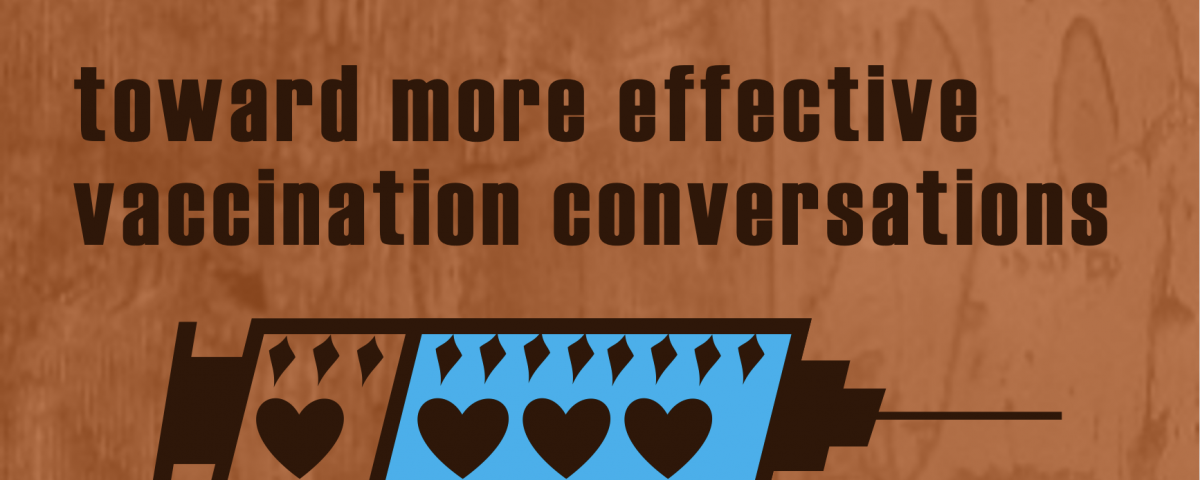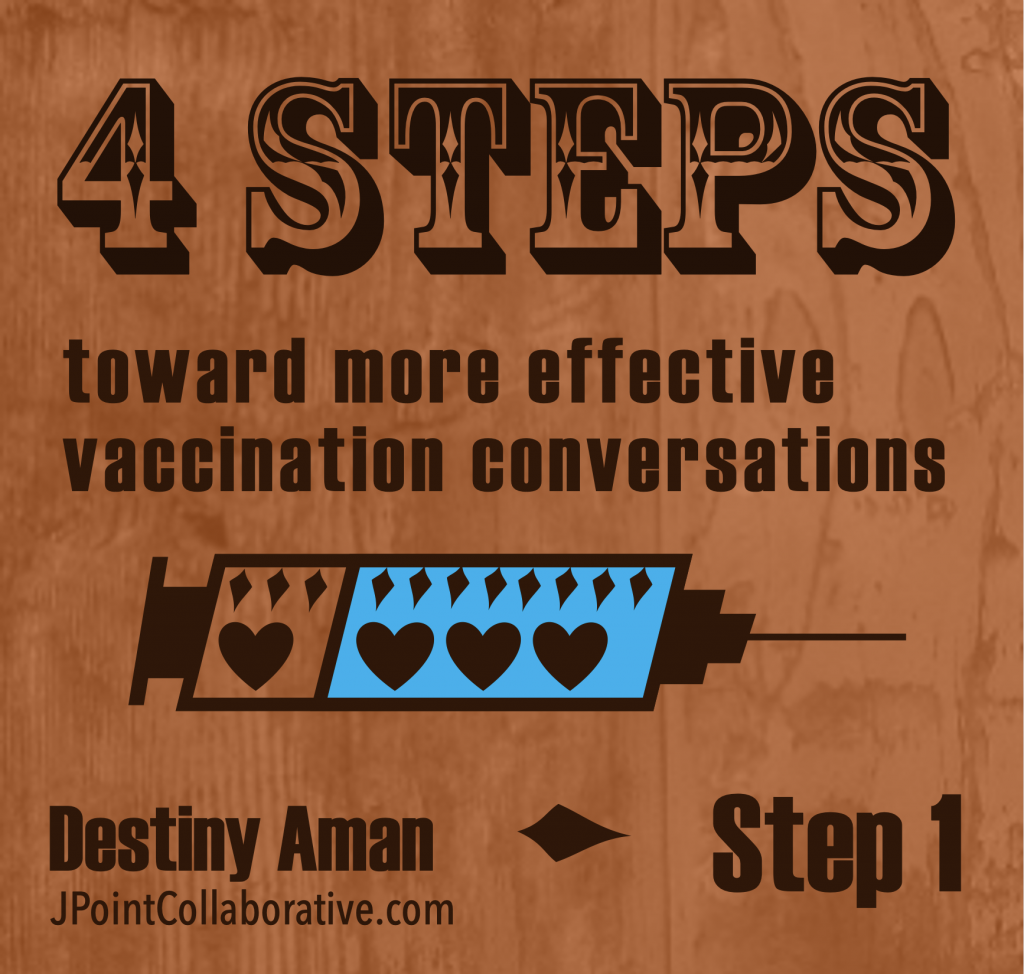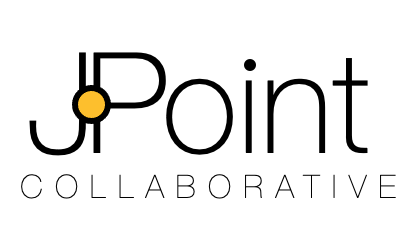Crossing the COVID Vax Divide: How to have more effective vaccination conversations using behavioral science


Destiny Aman, Founder, JPoint Collaborative
Recently I had the privilege of joining ICU lung physician Dr. Erika Moseson and immunologist Dr. Gigi Gronvall on the Air Health Our Health podcast for a great conversation about how to talk with friends and family about getting vaccinated. We talked about the special moment we’re in right now, with holidays approaching and new mandates increasing the social pressure (and the PITA factor) associated with remaining unvaccinated.
Meanwhile, as hospitals fill with unvaccinated people, many folks are experiencing compassion fatigue and having a much harder time staying engaged with unvaccinated loved ones. But as a behavioral scientist, I argue that there are plenty of opportunities in this place of transition for people to connect with unvaccinated folks in impactful ways – by leaning less on facts, and more on connection.
In the first podcast session, Dr. Gronvall answered common questions about vaccines that typically get folks hung up (things like how the vaccines work and why we know they’re safe), and I presented some suggestions for how that information could be presented to non-experts in an accessible, compelling way (using Star Wars references, if need be 😂).
In the second podcast session, we dug in deeper into what influences people’s decision-making around vaccination, and I present four steps to having more effective conversations with loved ones about getting vaccinated.
Those steps are included here for easy reference. While these suggestions are aimed at vaccination hesitancy, they can easily be repurposed to encourage other preventative behaviors – including masking and clean air protocols.
4 Steps Toward More Effective Vaccination Conversations
- Reflect on and invest in the relationship.
- Identify common ground, and (importantly) validate that shared common ground.
- Address barriers, using your own personal story.
- Make a gracious and respectful exit.
I’ll be digging into these steps in more detail in a series of blog posts that you can find on JPointCollaborative.com. Below, you can find the first step, but check back over the next week or so for the others, or just listen to the [second podcast session [need link from Erika].
Step 1: Reflect on and invest in the relationship.
It may be a surprise that the most effective tool of persuasion that you have available to you when having a conversation about vaccination today isn’t your knowledge about vaccination or all things COVID-19, but rather the quality and character of your relationship. In particular, the trust and care that you share for one another matters a great deal. These social and interpersonal elements appear over and over and over again in the research on what most drives human behavior during pandemics.
This means -good news!- you don’t have to be a technical expert to have these conversations. You don’t even have to talk like an expert. The dirty little secret of risk communications is that technical experts aren’t actually all that great at communicating about risk. This is, in part, because they don’t have personal relationships to amplify their message. Plus, most scientific disciplines train experts to be stoic and to separate objective truth from squishy feelings like love, care, and fear. But people actually need connection to make sense of the world, so that professional stoicism can actually work against them in terms of communicating effectively and influencing behavior. This is especially true now, when most peoples’ cognitive frameworks have been hardened by time, politics, and fatigue, and they are less likely to accommodate information that just doesn’t fit.
This is one of the reasons why people are more likely to adhere to pandemic guidelines when their close circle does. Social influence matters even more than people thinking it’s the right thing to do. These social relationships impact our behavior a great deal. Not because we are stubborn or stupid, but because we are human – remember, scientific facts haven’t been around all that long in the course of human existence, but other people have. Peers have. Humans got ahead evolutionarily by establishing relationships, learning who to trust, and then caring about one other deeply. If we’re going to be successful with this conversation, we need to work with this tendency, not against it.
So how can you best access the feelings of care you have for this person? I have two suggestions:
- Juice your appreciation: Take some time before you talk to them to reflect on your relationship, and the things you appreciate about this person. Write them down, so you can have an easy reference if you need one. Here’s an exercise to help you juice up your appreciation for this person, in anticipation of your conversation.
EXERCISE: Find a notepad and a pen, set a timer for four minutes, and:- List out all the positive qualities you can think of about this person
- List some positive memories or experiences you’ve shared
- List some things you agree with this person about
- List the ways this person has a positive impact on their community or the world in general
You can bring these lists with you (on your phone or in your pocket) and consult them before you speak to your person. If you plan to talk on the phone, set them out for easy reference while you’re talking. Having this positive info at top of mind will help you follow through on the next steps.
- Demonstrate your care: A lot of times when we know we may have a difficult conversation with someone, we may be tempted to just jump right to it. But your conversation will be more effective if you demonstrate the investment that you have in the relationship, and invite the other person to do the same. The best way to do this is to just spend time together – talking, hanging out, catching up. This could happen before you bring up the topic of vaccination, or as an exit strategy (which we will discuss in Step 4).
One benefit to taking time to just connect is that it tends to put folks in a good mood, which is associated with higher persuadability, and can serve as a buffer for any reactivity the person may have around the topic.

